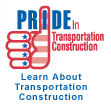





 |
 | |
    | ||
|
|||
     |
"Train Wreck Ahead"
Without
Washington, D.C. [July 30, 2002]—The American Road & Transportation Builders Association (ARTBA) today urged Congress to fine-tune the federal Clean Air Act (CAA) transportation conformity requirements and the federal highway program to help further improve air quality and prevent abuses of the federal and state transportation planning processes by development opponents. The CAA conformity regulations tie a state or local community's ability to move transportation improvement plans forward to their demonstrated or projected ability to meet federal air quality standards. The process depends on computer modeling and agency assumptions on issues like future population and economic growth and driving and mass transit use projections. States or local governments that fail to demonstrate their transportation plans will "conform" with the area's federally-mandated emissions reduction plan can have their share of federal transportation dollars withheld. In testimony before the Senate Environment & Public Works Committee, ARTBA's witness, James Stephenson, president of the Yancey Bros. Co. in Atlanta, Ga., said: "One of the major problems with the conformity process is that many people think it's an exact science, when it is not." Conformity lapses don't occur because air quality is getting worse. It's not. EPA data show it's continually getting better in almost every community. "Conformity lapses occur because government agencies miss deadlines for filing paperwork," or the assumptions they used for the computer modeling are challenged, or the computer models are challenged, or because the emissions reductions they are trying to squeeze out of an increasingly cleaner transportation sector, relative to all other sources of pollution, are unrealistic. Stephenson said an ARTBA survey of state transportation departments found that $1.3 billion-worth of transportation improvement projects nationwide were delayed last year due to conformity hang-ups. Over the past three years, opponents of increased road capacity have used the conformity process as the platform for litigation challenging over $40 billion worth of transportation projects. Stephenson urged the committee to put state and regional transportation and air quality planning and report filing requirements on concurrent time schedules. He also recommended giving state and local governments more flexibility by allowing a "very small margin—five to 10 percent—of modeling or assumption error" in the demonstration of transportation plan compliance with federal air quality standards. Unless more flexibility is built into the conformity process, Stephenson said, "we are headed for a conformity 'train wreck' when the new, tighter emissions standards for ozone and particulate matter are implemented." Stephenson said states should also be allowed to give transportation contractors tax credits or grants through the federal highway program's Congestion Mitigation and Air Quality (CMAQ) program for retrofitting or replacing older, off-road construction equipment engines with new emissions reduction technology. Such a "carrot rather than stick approach" would yield substantial air quality benefits quickly, he said. All projects funded through the CMAQ program, Stephenson added, "should be held accountable" for quantifying their emissions reduction potential and, once funded, success. ARTBA, which is celebrating its 100th anniversary in 2002, exclusively represents the U.S. transportation construction industry in the Nation's Capital. Transportation construction generates $200 billion in U.S. economic activity annually and sustains 2.5 million American jobs. # # # Editor's Note: The complete text of ARTBA's testimony can be found online at http://www.artba.org/pdf/stephenson_testimony_07_30_02.pdf. (PDF format 192K)
Meetings & Events | Join ARTBA | Members-Only | Foundation Programs About ARTBA | Search | Site Index | Industry Links | Home
|
|||||||||